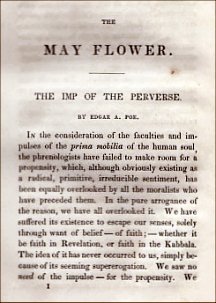

|
<<< Continued from previous page Victorian gift books, also called literary annuals, were extremely popular for Christmas gift-giving in the middle of the 19th century, particularly between the years of 1820 to 1850. These anthologies contained poetry by both famous as well as deservedly forgotten authors compiled and bound in attractive hardcover bindings, often blindstamped leather or ornately decorated cloth. Most annuals were issued in November of the year preceding their stated date - in other words, an annual dated 1846 would actually be published in November of 1845 for holiday gift giving prior to the new year. Gift books were a profitable industry in their day, and publishers paid generous sums to author/contributors for their stories and poems to appear alongside beautifully engraved lavish illustrations. Today, you may find a once-ornate Victorian gift book past its prime with worn and frayed leather binding and heavily foxed engraved illustrations, but if you see Poe listed as one of the authors, don't pass it by. Edgar Allan Poe's story, "The Imp of the Perverse," which was first published in the July 1848 Graham's Ladies Magazine, made its first book appearance in the 1846 The May Flower gift book, originally offered for sale in late 1845. One of many Victorian gift book annuals competing for customers' dollars in the decade of the 1840s, The May Flower was issued in three annual volumes from 1845 to 1847, each containing different literary selections along with steel engravings. Even with condition problems including heavy binding wear, a missing illustration plate and two pages missing from the text, a copy of this 19th-century anthology was definitely worth picking up for resale. It sold on eBay in October, 2006 for $180.00.

The following is a list of 19th century anthology annuals and gift books containing first printings or authorized reprintings of works by Edgar Allan Poe (courtesy of the Edgar Allan Poe Society of Baltimore): The Gift. Philadelphia, Poe items in the volumes for 1836, 1840, 1842, 1843 and 1845. The Baltimore Book. Baltimore, Poe item in the volume for 1838. The Opal. New York, Poe items in the volumes for 1844, 1845. The May Flower. Boston, Poe item in the volume for 1845. The Missionary Memorial. New York, Poe item in the volume for 1846. The Irving Offering. New York, Poe items in the volume for 1851. The American Keepsake. New York, Poe item in the volume for 1851. Not every 19th century anthology will yield a treasure. There are countless antiquarian anthologies out there with nothing to distinguish them other than their attractive Victorian bindings. Nevertheless, as noted above, many times a pretty volume with a florid title like The May Flower will be discounted as a piece of fluff, when in fact, it is can be so much more than is indicated by title alone. Of course, it is not necessary to memorize every anthology issue containing a work by Poe or the presence of "A Visit from St. Nicholas," but do be sure to flip through a table of contents before walking away from any 19th century anthology. If you recognize an author, at least give the anthology a second glance. There is one anthology title that should be committed to memory: The first appearance of Emily Dickinson's poem "Success is counted sweetest" can be found in the 1878 poetry anthology A Masque of Poets. "Success" was the only poem by Emily Dickinson to be published in a book during her lifetime - it was submitted by Helen Hunt Jackson, a close friend, without the author's approval - though several poems were published in newspapers. A Masque of Poets was published in 1878 as part of the Roberts Brothers of Boston "No Name Series." The concept was to "select the very best title possible for a series of Original American Novels and Tales, to be published Anonymously. These novels are to be written by eminent authors, and in each case the authorship of the work is to remain an inviolable secret ... No name will help sell the novel, or the story, to success. Its success will depend solely on the writer's ability to catch and retain the reader's interest ..." Because the premise of the "No Name Series" was to present poems anonymously so no prejudgment could take place based on knowledge of the authors' names, there is no designation in A Masque of Poets that points to Emily Dickinson as the author of "Success." So, the next time you run across a 19th century anthology, remember that, while the lowly non-descript anthology can seem be the worst of tomes in cloaking its secrets, it can also be the best of tomes if you know what to look for. Happy Hunting!
< to previous article to next article >
Questions or comments?
| Forum
| Store
| Publications
| BookLinks
| BookSearch
| BookTopics
| Archives
| Advertise
| AboutUs
| ContactUs
| Search Site
| Site Map
| Google Site Map
Store - Specials
| BookHunt
| BookShelf
| Gold Edition & BookThink's Quarterly Market Report
| DomainsForSale
| BookThinker newsletter - free
Copyright 2003-2011 by BookThink LLC
|

|
|